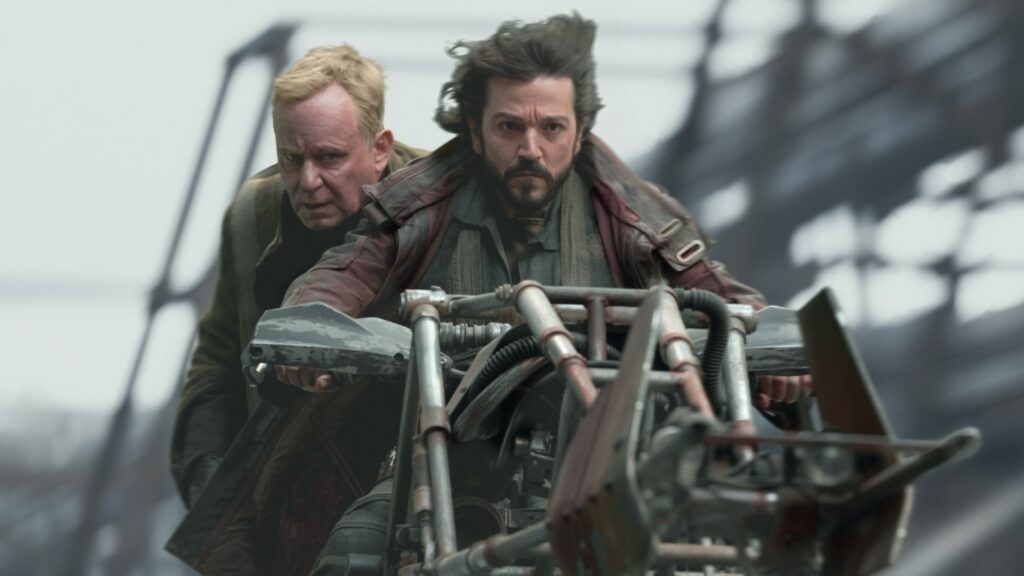
As I continue to work hard on finishing my dialogue book, I took note of one of the comments from last week which basically said the following: “When’s the last time somebody went to a movie for the dialogue?”
That question got me thinking. Because the truth is, I haven’t gone to see a movie for the dialogue since, probably, Juno. I remember hearing how great the dialogue was in that movie so I was excited to check it out.
But since then? Maybe the occasional Woody Allen or Tarantino movie had me intrigued about the dialogue. But I wouldn’t say that was the main reason I went to see those movies.
This had me wondering, do people even care about dialogue anymore? In the 90s, it was everything. During the indie boom, movies were graded heavily on their dialogue. But movies have changed radically since then. They’re more focused on thrilling you with a great space battle than impressing you with a clever turn-of-phrase.
Then reality slapped me in the face. Of course dialogue is important. It may not be the primary reason someone goes to the movies. It may not even be in the top 5 of their priority list. But I know this. Agents and producers are DESPERATE to find good dialogue writers.
Because they’re so freaking rare!
98% of working writers are able to fake their way through dialogue. By that, I mean, they know all the things you’re *not* supposed to do. So they can avoid those pitfalls and make their dialogue passable.
Only that tiny top 2% can write dialogue that sings. And, for that reason, those writers are very valuable. TV shows, which are more dependent on dialogue, are desperate to hire those writers. Producers constantly need to hire dialogue superheroes to do dialogue passes on their scripts. And those dialogue passes pay big money.
This doesn’t even begin to cover actors, who value great dialogue above everything. These are the lines they’re going to be saying so you bet your plucky pocketbook they’re choosing the scripts with the best dialogue.
That’s the thing you have to remember. The audience might not be showing up for the dialogue. But all the people who make movies? They’re looking for great dialogue writers.
Which is a long way of saying: Keep an eye out Mid-October for the Scriptshadow Dialogue Book! Oh, and I’m currently reading plays for the book. If you’ve got any suggestions for great modern plays, stuff written post-1990, please leave them in the comments.
Okay, moving on!
I’ve got two big things I’m looking forward to this week. On Wednesday, Andor comes out. And on Friday, Don’t Worry Darling comes out. Now a lot of you might be confused about my excitement for Don’t Worry Darling seeing as it’s got one of the “All Men Are Drowning in Toxic Masculinity” champions of the industry, Olivia Wilde, directing it. Which isn’t surprising since that’s basically what Don’t Worry Darling is about.

But there’s a lot more going on with this movie than just that. It’s a spec script. And I always root for spec scripts. Not just a spec script writer-director. But a spec script that writers wrote, somebody purchased, and then another director made. I love when that happens. It gives me hope that, if the movie does well, it will start a spec resurgence.
It’s got a sci-fi slant, which you know I love. And I particularly love when writers mix subject matter that normally would have nothing to do with sci-fi. The last thing you would expect in a 50s suburban neighborhood drama is a sci-fi twist.
I think the cinematography and vision of this movie look amazing. That shot in the trailer where Florence Pugh is being squished up against the wall by an invisible shield hints at a really creative mythology that I’m totally down for.
And then you’ve got one of the best up-and-coming actresses in the world in the lead role with Florence Pugh. I think she’s amazing. So I want to see what she’s going to do in the role. I also think it’s funny that she hates Olivia Wilde. The movie is about feminism and the two main female talents on the project hate each other. Come on, you have to love the irony.

Anyway, I’m going to be reviewing the movie next Monday. So BUCKLE UP.
Since we’re talking about feminism, let me take a quick detour before we cover Andor. The Woman King not only took in a surprising 19 million dollars this weekend, it got an A+ Cinemascore! Holy coyotes. I used to think that cinemascores were worthless but it turns out they’re the best indicator of how well a movie will do over time at the box office.
The movies with the highest scores have the lowest financial declines week-to-week. Case in point, the number one movie of the year, Top Gun Maverick, had an A+ Cinemascore. Meanwhile, Jordan Peele’s “Nope,” which did lousy in the weeks after its opening, received a B Cinemascore.
I’ll probably wait for this one to come out on streaming before I watch it. I’m having a bit of a suspension of disbelief issue with Viola Davis as an action hero. I mean, what’s next? Paul Giammati as Alexander the Great? Michael Cera as Hercules? Still, we always complain in the movie business that they don’t make anything different anymore. This movie is definitely different. So I’m glad that they found success in a market that isn’t always accepting of new ideas.
Okay, moving on to Andor. We’re just three days away from the Star Wars series that NOBODY thought would happen. This comes on the heels of Lucasfilm officially shoving a thermal detonator into the gullet of Rogue Squadron, which has been jettisoned from the Star Wars line-up, made to rot in perdition along with Rian Johnson’s future trilogy that was going to have every single person in the universe be a Jedi. The tagline, I hear, was: “We’re all special!”
The first reactions from Andor seem to confirm what everyone already assumed, which is that it’s a super serious version of Star Wars. The issue with social media reactions is the same issue that’s happening with these “7 Minute Standing Ovation” stories from film festivals. Once you establish that every single movie is getting one, it doesn’t mean anything anymore.
Those social media reactions claiming that every new Marvel release was the best Marvel film yet numbed all of us to them. Even worse, if your movie DIDN’T have “this was the greatest thing ever” reactions, and only had, “Yeah, it was pretty good” reactions, we knew the film was hogwash in a hand basket.
Andor is coming in with very tepid praise. “Yeah, it’s different from every other Star Wars,” people are saying. Okay, but nobody cares about that. They just care if it’s good. I still think it was an enormous gamble to build a show around a character who didn’t even pop in the original movie he was in. Rogue One made most of its money based on the fact that the average moviegoer thought it was a sequel to The Force Awakens. It didn’t make a bunch of money because it was a good movie. Arguably, it didn’t have a single stand-out character in it.
I’ll pose the question to you guys. Name me, in order, your top 3 characters from Rogue One. I’m guessing that K2SO, the big droid, comes out as number 1. And he was just some side character. He didn’t even have a big role.
The only thing that gives me hope here is Peacemaker. Peacemaker was lame in The Suicide Squad. But his show was absolutely awesome. Maybe once we get Cassian Andor away from the big plot in Rogue One, and let him breathe a little, he becomes a far more interesting character. I sure hope so. Because they’re giving us 12 episodes of this thing. The biggest Star Wars show by far. If it’s great, I’m going to be doing jumping jacks in roller skates.
I’ll review that either at the end of the week or next Tuesday.
In the meantime, I’ll be watching my current favorite show, House of the Dragon. This show is exceptional. I’m completely bought in. I’m a little nervous about the impending time jump and getting rid of Young Rahenyra. But I have so much faith in the writers, at this point, that I’m giving them the benefit of the doubt.
This review was originally in a newsletter but with the recent release of the trailer, I decided to officially put it up on the site. Enjoy!
Genre: Period/Hollywood
Premise: Follows a young Mexican man in the 1920s who has aspirations of working in Hollywood. But when he falls in love with a crazed rising star, his life becomes one giant whirlwind.
About: Babylon will be Paramount’s big Oscar entry in 2022. Originally meant to bring Damien Chazelle and his La La Land actress, Emma Stone, back together, Covid reset the scheduling chess pieces so that Stone was forced to leave the project. Luckily, Chazelle appears to have upgraded the role, with Margot Robbie taking over. Robbie will re-team with her Once Upon A Time In Hollywood co-star, Brad Pitt, which seems apropos considering this is another movie about old Hollywood. Chazelle wrote and is directing the film.
Writer: Damien Chazelle.
Details: One hundred and eighty-four f@#%ing pages no I’m not lying.
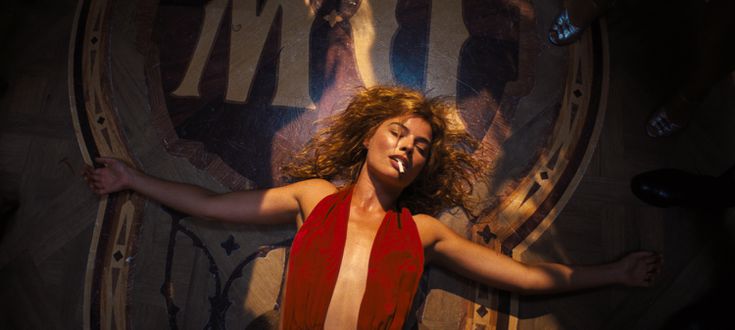
I always have to be careful with Damian Chazelle because I’m not his biggest fan, yet I understand that a lot of people love his stuff.
But, I mean, come on. This is some of the most self-masturbatory writing I’ve witnessed in a decade of reading scripts. Damian Chazelle wrote this movie for one person and one person only – himself. And probably while he was on a lot of drugs. Cause there is nothing about this story that… well… works. It feels like the equivalent of a madman ranting on the corner of Melrose and La Brea for three hours.
Manny Tores is 21 years old with dreams of working in the entertainment business. He’s somehow managed to secure an assistant job with Hollywood bigwig, Don Brady. Don is throwing a party tonight and he wants it to be memorable. Which is why he’s asked Manny to secure him an elephant.
It turns out that securing an elephant for a Hollywood party in 1926 (when our movie is set), isn’t easy. There aren’t a lot of trucks that can transport an elephant. But there is no way Manny is showing up at this party without the one thing he’s been hired to secure. So Manny convinces a driver to tear off the roof off his truck in order to transport the elephant.
Don Brady’s party is crazy. Within ten minutes, an obese man accidentally kills a hooker who he’s hired to pee on him (yes, it is that kind of movie). Meanwhile, Manny’s hanging out in the back yard when a car bursts through the bushes and crashes into the fountain. Over-confident nobody and self proclaimed mega-actress Clara Bow, who’s never had an acting role in her life, asks who put this stupid fountain here then waltzes into the party like it’s the most normal thing in the world.
Clara is LOUD and BOISTEROUS and says things like, “You know you’re not bad looking,” and then, a second later, “Take your clothes off.” Which is how Manny has sex with Clara less than ten minutes after meeting her. For Manny, it’s love at first sight. For Clara, it’s one more bang in a long line of hankey-pankeying. Besides, she’s got more important things to do, like impress Jack Conrad (Brad Pitt), the biggest movie star in the world. Gotta mingle if she’s going to execute her plan of being the greatest actress ever.
By the way, in 1926, movies are silent. So you didn’t have to be some amazing actor. You just had to look like a star on screen. Using the party as a springboard for her first role, Clara shows up on set the next day and convinces the director to upgrade her tiny role to a bigger role and, what do you know, she nails it! When the movie comes out, Clara is officially the new hot thing.
As 1926 becomes 1927 and, eventually, 1928, the slow transition to FILM SOUND begins. You would think this would have a major effect on the plot but Chazelle isn’t a good enough writer to pull that off. So it becomes this back seat annoyance that occasionally pops its head up to the front. Clara has to learn how to read lines since her voice will be heard. Jack Conrad doesn’t like “talkies” which leads him to trying out Broadway for some reason.
Through 1929 and 1930, Manny works his way up to being a studio exec. A studio exec with a bad drug problem. Clara had a drug problem. Now Manny has a drug problem. Sure, no repetition in character development there at all. SARCASM! Manny hires Clara for roles as much as he can so he can be around her. But Clara has lost it by this point. She was a trainwreck as a nobody. As a big star, she’s a trainwreck supernova. Her big vice is gambling. When things aren’t going well for her, she drives off to Vegas and gambles.
During a particularly bad day on set, Clara does just that, leaving the production without telling anybody and playing blackjack all night at a casino. She loses 83 thousand dollars that she doesn’t have. Manny, who still loves Clara, informs the casino that he’ll take the IOU. But when Manny can’t pay the money, the bad guys come after him *and* Clara.
Manny tells Clara they have to flee to Mexico. A drugged out Clara half-agrees and off they go. But the bad guys catch up and Manny is faced with a choice. Try to save Clara one last time or get the hell out of here. He chooses to get the hell out of here, leaving Clara to the sharks. Her fate will remain unknown. Twenty-five years later, Manny comes back to Hollywood and decides to watch a movie. It’s Singing in the Rain. He cries. Fin.
I have no idea what I just read.
I guess the one good thing you can say about Babylon is it’s better than Mank. Mank was rambling and dreary. At least this is rambling and crazy. It has an energy to it. But you guys know my screenwriting philosophy at this point. Simple story, complex characters. This is not that. This is a complex story with too many characters and not enough connective tissue to bring it all together. It may sound like there was a story here by my summary. But that’s only because I moved literary mountains to write a summary that made sense.
Here’s the problem. Chazelle loves this era. In the same way that Fincher loved Citizen Kane. And when artists love something this much, they want to include everything. Storytelling is the opposite of that. It’s eliminating information that gets in the way of the story you’re trying to tell.
There’s this scene in Babylon where Clara gets really drunk at a party and decides she wants to fight a rattlesnake. She keeps yelling and screaming until someone finds her a rattlesnake, she fights it, and it bites her. This leads to a Pulp Fiction ripoff scene where they have to hurry Clara to the hospital to get her the anti-venom so she’ll survive the snake bite.
In a vacuum, you can argue it’s a fun scene. But in a movie that’s constantly zig-zagging around without purpose, it’s one more scene that takes us further away from a comprehensible storyline. Ditto spending 10 pages of your movie following an unnamed “Obese Man” with a pee-fetish who accidentally kills a hooker. How does this push the story forward at all? It’s one more wild and wacky moment in a movie full of wild and wacky moments.
During this read, I was constantly thinking about Once Upon A Time in Hollywood. There are a lot of similarities between the two. They both explore one of Hollywood’s golden ages. They both explore the weirdness and insanity of the movie business. They both endear themselves to the wily characters you find in this industry. Yet one felt utterly assured of itself while the other felt desperate and untethered.
One of the early jokes in Babylon is that this elephant Manny picks up keeps pooping. There are so many references to this elephant pooping, you’d think we were watching Horton Hears a Poo. Then, when Manny gets to the party, he’s told by Don Brady’s second-in-charge to deal with the crazy gossip columnist downstairs who’s lost her dog. So Manny locates her, she screams that her dog is missing. Manny finds the dog a few minutes later, only for the dog to take a poo on the couch.
That’s two animal pooping jokes within the first 20 minutes of your movie. I just thought, “Would Quentin Tarantino ever stoop to animal pooping jokes?” Of course he wouldn’t. Animal pooping jokes are the classic signs of a desperate writer. A writer who doesn’t have the confidence that they can keep your attention without something crazy and wily going on. A fat studio exec has to get pissed on. An elephant needs to be pooping. The lead female character needs to blurt out things, apropos of nothing, like “Should I shave my pu$$y?” That’s the writing talent on display here. I still don’t understand how this guy has become successful.
If he was a halfway decent writer, he would’ve realized he had a clear story to tell. You focus on a famous actor or actress in the silent film era who must make the transition to “talkies.” The obstacle is they have a weak voice. This happened to a lot of silent movie actors when sound came around. They didn’t sound like the audience thought they did and their careers nosedived. Just tell the story of one of those people.
Instead, we get this desperate hackneyed unfocused blitzkrieg through Hollywood in the 20s. I mean…. Hollywood loves them some movies about old Hollywood. And with Robie and Pitt, I’m sure this will look great. But I’ll eat my boxers if they’re able to salvage anything good out of this script. It’s complete and utter nonsense.
[x] What the hell did I just read?
[ ] wasn’t for me
[ ] worth the read
[ ] impressive
[ ] genius
What I Learned: There is no script you need extra eyes on more than your passion project. Artists have ZERO objectivity when it comes to their passion projects. They want to include everything. But like I said earlier, you can’t do it. You have to identify what your script is actually about and strip away everything else. I contend this is a movie about an actress who is great in silent films but doesn’t have the voice for when the industry transitions to talkies. If Chazelle would’ve realized that, he wouldn’t have a wandering 180 page script. He’d know exactly what needed to be cut. So when you’re writing about something you love dearly, get an extra set of eyes on it and ask those eyes what they think your script is really about. Once you get that answer, start cutting out everything else.
GET A SCRIPTSHADOW SCREENPLAY CONSULTATION! – As much as we writers think we can do it alone, we need help. We need fresh eyes on our material. Without that, we can’t identify the problems in our scripts. We won’t figure out where we need to improve as a screenwriter. I’ve read over 10,000 scripts. Done over 1000 consultations. I am the guy who can figure out the issues hampering your script AND HELP YOU FIX THEM! I have a 4 page notes package or a more detailed 8 page option designed to exponentially improve your screenplays. I also give feedback on loglines (just $25!), outlines, synopses, first acts, or any aspect of screenwriting you need help with. This includes Zoom calls discussing anything from talking through your script to getting advice on how to break into the industry. If you’re interested, e-mail me at carsonreeves1@gmail.com and let’s set something up!
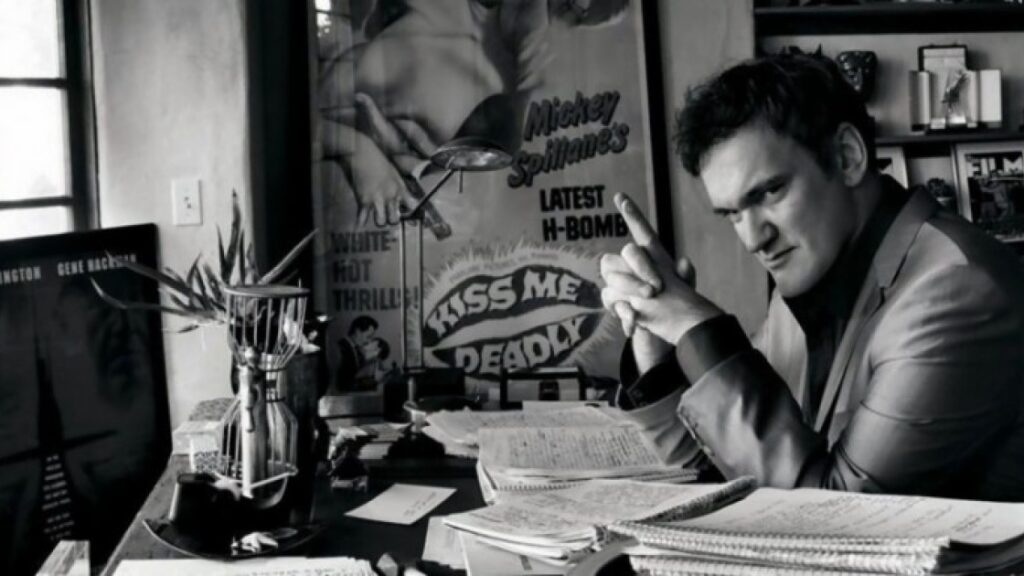 Write dialogue like this guy!
Write dialogue like this guy!
The bulk of the Scriptshadow Dialogue book is written. The one chapter I’m still working on is this chapter I’m tentatively titling, the “verbal arena.” This is the chapter that’s going to teach you how to write like Tarantino, Woody Allen, Diablo Cody, Aaron Sorkin. I know some of you will scoff at this but that’s my goal. Sure, I can’t make you as good as those writers. But I can give you the tools to get a lot closer to them than you are now.
So, I’ve been watching a lot of “verbal arena” movies – flicks where the dialogue is inventive and fun and memorable – trying to decode that unique dialogue Matrix within. The other night, I watched Barry Levinson’s, “Diner,” which I hadn’t seen in 20 years and didn’t remember well. But I’ve heard a lot of people talk that movie up as an example of great dialogue.
Man, I have to say, I was really disappointed. Outside a couple of minor exceptions (“Where’d you get this attitude?” “Borrowed it. I’ll have it back by midnight.”) it was mostly mundane middle-of-the-road conversation. I *was* shocked when I realized just how much Swingers borrowed from the film. But, other than that, it was an average movie with, maybe, slightly-better-than-average dialogue.
At that point I was going to go to sleep but then I remembered a script whose dialogue had always impressed me and decided to bust it open and read a few pages to see if I still felt the same way. The script is called “Daddio.” It was a high ranking Black List script from five years ago.
Let me tell you: I’ve been reading A LOT of dialogue over the past few weeks — from amateur scripts, to pro scripts, to pantheon level classic movie scripts — I’m not exaggerating when I say the dialogue in the first ten pages of this script blows almost all of those scripts away.
So much so that I’m going to spend the next few days ONLY diving into this script and trying to figure out what Christy Hall is doing that makes her dialogue so good.
Now, the scene that I’m about to show you is a little different in that it’s more a monologue than a dialogue. But it’s so good I think it’s worth highlighting. In the scene, our main character, Girlie, has just landed at JFK airport, and is going to meet a guy who, from the limited text messages we’ve seen between the two, doesn’t seem all that into her, which is something she’s trying not to think about too much.
The cabbie guy becomes a temporary distraction from this potential down-the-road problem. The script takes place entirely in the cab as we ride from JFK to this guy’s place. It’s one long conversation. What we’re seeing here is the beginning of the conversation.
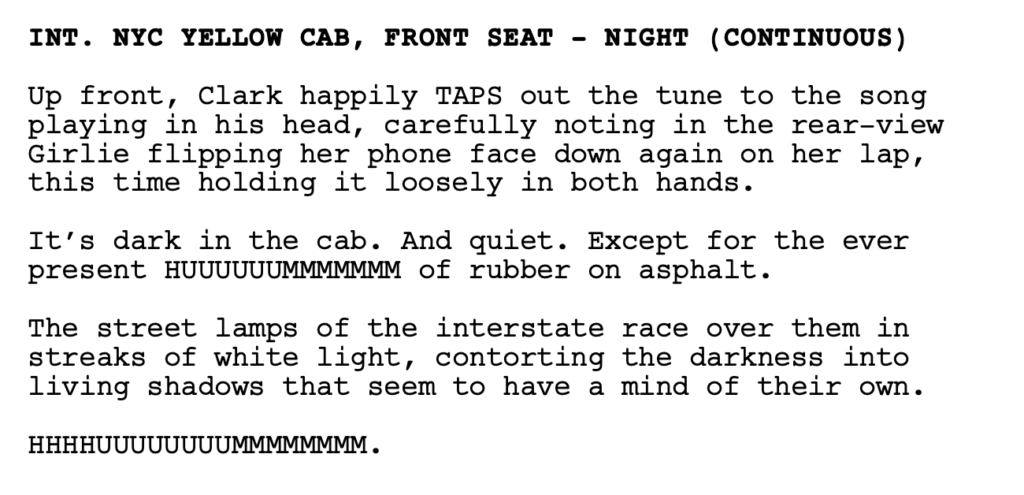
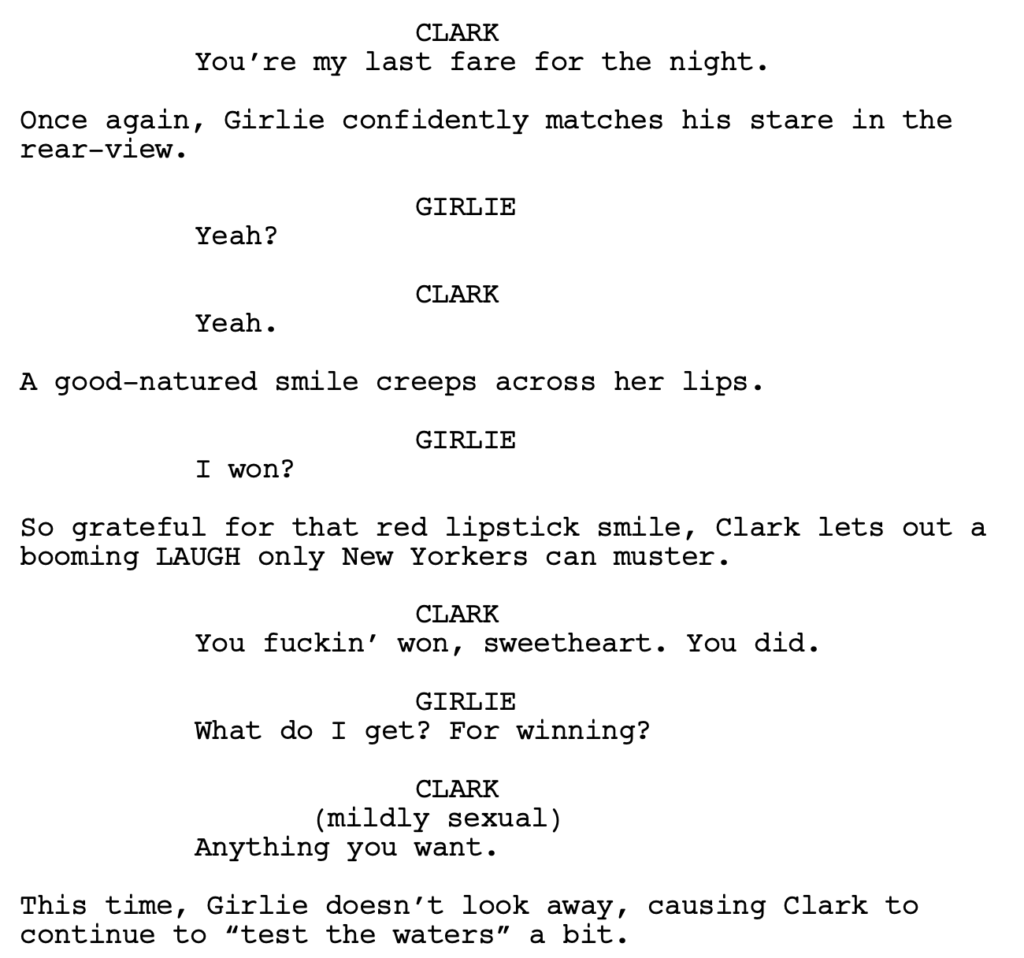
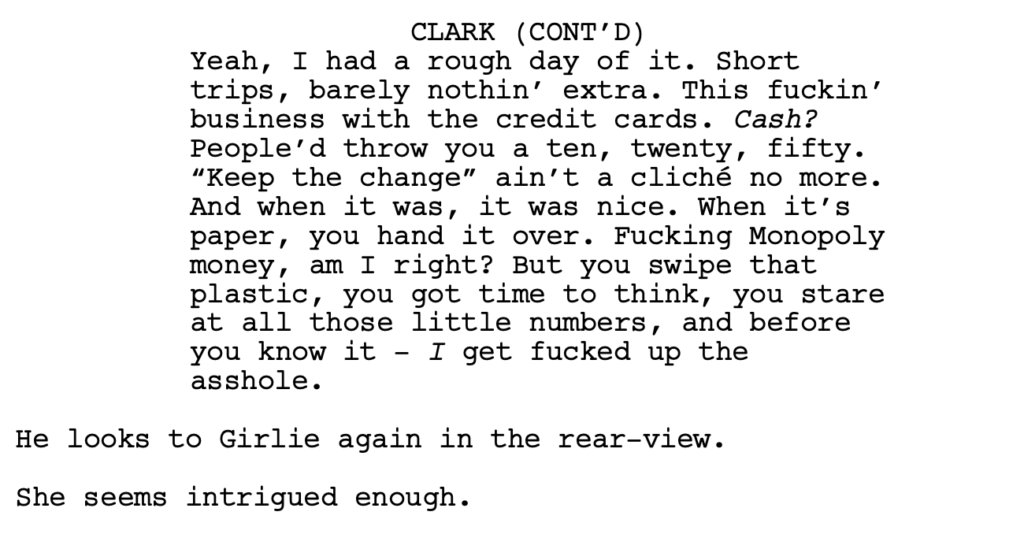

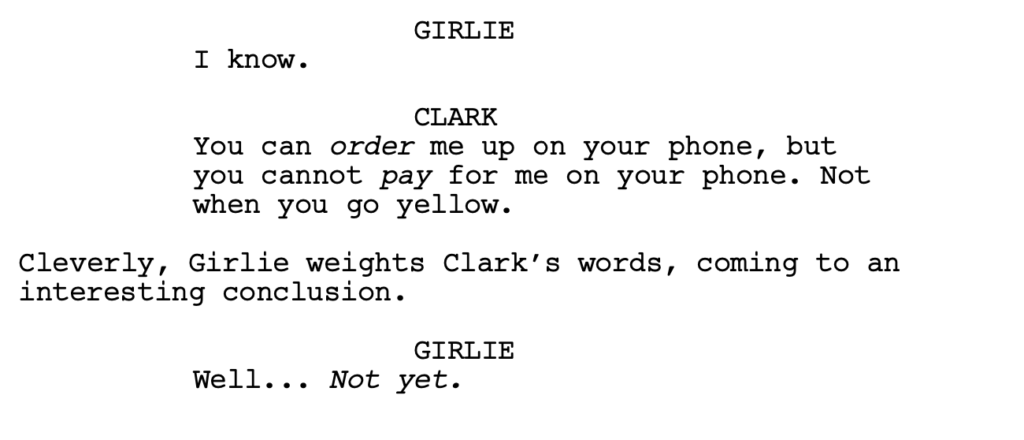
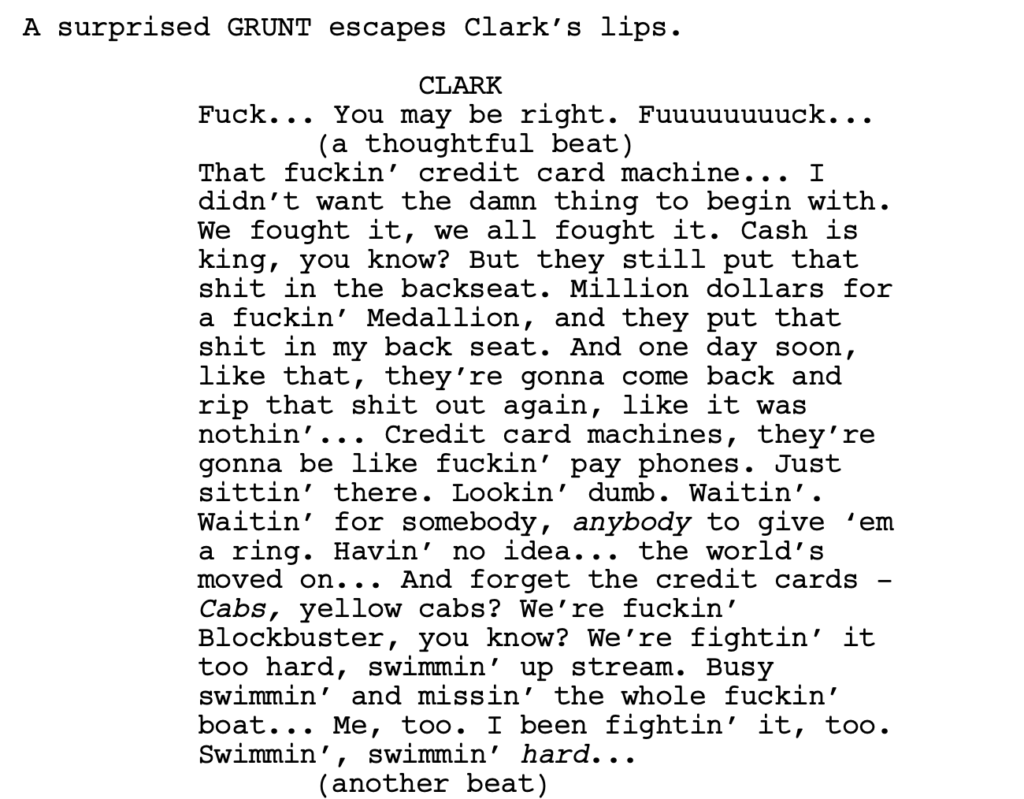

The first thing you want to pay attention to here is the organic nature of the conversation. This isn’t a “normal” scenario. For example, this isn’t two people waiting at a valet stand for the valet to pull their car up. It’s a long cab ride. There’s a lot of down time involved. Conversations are different in down time. They’re not as immediate or necessary. People are more likely to ramble, which is why this scene works, whereas, if it were at the valet stand, a long philosophical rant about rideshare apps taking over the world would feel try-hard.
My point is, know the situation in order to know what kind of dialogue you can use. The rambling nature of this dialogue works because it’s organic to the situation.
The first segment of Clark’s dialogue is the most “normal.” It’s a guy talking about how his day sucked, he didn’t get a lot of good fares, and he’s unhappy about this payment switch to credit cards cause he makes less money on it. Most writers could write this segment. Although, I thought the “Monopoly money” choice was thoughtful. More creative than saying, “Cash.” Look for these little opportunities to replace standard words with something more imaginative.
The second segment, however, is where Hall starts to take off. She’s in a triple-7 and everyone else is putt-putting around in a Mini Cooper. Quite frankly, it makes me jealous. Usually, when I read dialogue, I can break down what the writer is thinking and how they crafted the scene to make the dialogue work. But here, there’s so much going on, it’s impossible to keep up.
I like the exaggeration and specificity after the mention of the word “app.” It isn’t just, “These f#$%ing apps are making my life miserable.” It’s, “And now, these f@#%in’ apps, all of ‘em – can get a cab, a coffee, burger, soap, socks, wine, water, Chinese f@#%in’ take out – you can get all that s@#t, and not even reach for your purse, not once, not even for tip.”
Reeling off a number of items drives home the reach of this emerging “app world” Clark hates so much.
From there, the monologue accelerates even more. I’m noticing that in “verbal arena” writing, writers use a lot of metaphors. A metaphor takes an object or action and compares it to something familiar but unrelated. “Charles was a fish out of water.” “Love is a battlefield.” “Life is like a box of chocolates.”
Good writers don’t just use quick familiar metaphors. They take those metaphors and play with them. They extend them (which is why this device is known as an “extended metaphor”). That’s a big part of what’s going on in this scene. Our cabbie character is obsessed with this idea of “the cloud,” and how everything goes up into the cloud. But instead of solely treating the cloud as the technical thing that it is, in this case, it’s used as a metaphor for a real cloud. And what happens when real clouds get full? They start raining.
Hall also intermittently uses something called “personification.” This is when you take a non-human object and you give it human traits. “That big f@#%in’ cloud, thinkin’ it knows better. Swearin’ it can keep a secret.” Then later: “they’re gonna be like f@#%in’ pay phones. Just sittin’ there. Lookin’ dumb. Waitin’. Waitin’ for somebody, anybody to give ‘em a ring. Havin’ no idea… the world’s moved on.”
Another device Hall uses is something I call the “history lesson.” It’s when a character will bust out some historical story or fact that teaches the reader a little something and adds variety to the monologue. We’re in the present and then – BAM – we’re in the far-off past.
“I mean… Salt used to be money. Mother fuckin’ salt. The same shit you sprinkle on your eggs. Yeah. Every mornin’ you toss that cheap-ass-shit all over your eggs with no idea that people used to die for it. Tea, coffee, same thing. All that shit you gloss over at the grocery store, at one point in time, humans fuckin’ killed each other for it.”
This moment in the monologue is important to highlight because I don’t think 99% of writers would’ve written it. Why go off on that tangent when you can be more succinct? But that’s who this character is. He’s a tangent guy. So you want him to go off on a lot of tangents.
Hall then writes my favorite line in the monologue: “Little numbers on a screen. You can’t touch it or hide it or bury it. Nah, you just tie it to a fuckin’ butterfly and send it to that cloud up there.” I have no idea what the device is here or how Hall came up with this line. It seems to be pure imagination, the writer’s own creativity. She could’ve easily written, “You can’t touch it or hide it. It’s just up there in the cloud, hovering.” Not nearly as imaginative.
I like how she also uses adjectives to spruce up, otherwise, bland objects: “But, one of these days, I’m tellin’ ya, that cloud’s gonna open up and it’s gonna pour acid rain down… all over our dumb faces.” It’s not “rain.” “Rain” is way too bland. It’s “acid” rain. It’s not “our faces.” “Our faces” doesn’t tell us much. No, it’s our “dumb” faces.
At every opportunity, Hall is looking to turboboost her sentences. She’s using every pixel to weaponize these words so that they have impact.
From there, she continues to use metaphors to make the dialogue more interesting. “We’re f@#%in’ Blockbuster, you know?” And, “We’re fightin’ it too hard, swimmin’ up stream. Busy swimmin’ and missin’ the whole f@#%in’ boat… Me, too. I been fightin’ it, too. Swimmin’, swimmin’ hard…”
The biggest lesson to take away from today’s dialogue example is metaphors. A lot of the color from this dialogue comes from Hall repeatedly dipping into metaphors. Yes, there’s more going on. But if you try to ingest it all, I’m afraid it will be too much. Just start to look for ways to incorporate more metaphors into your dialogue. Make sure you’re doing so in an organic way. And try to play with them a little bit so they’re not cliched metaphors. You don’t want to say things like, “Flying off the handle” or she has a “heart of gold.” These are actually referred to as “dead metaphors” because they’ve become so overused. Try to come up with your own metaphors and then extend (play with) them.
Here’s the screenplay for Daddio if you want to see more of Christy Hall’s writing. Leave your thoughts about what else she’s doing right in the comments. And, if you disliked the dialogue, tell us why.
GET A SCRIPTSHADOW SCREENPLAY CONSULTATION! – As much as we writers think we can do it alone, we need help. We need fresh eyes on our material. Without that, we can’t identify the problems in our scripts. We won’t figure out where we need to improve as a screenwriter. I’ve read over 10,000 scripts. Done over 1000 consultations. I am the guy who can figure out the issues hampering your script AND HELP YOU FIX THEM! I have a 4 page notes package or a more detailed 8 page option designed to exponentially improve your screenplays. I also give feedback on loglines (just $25!), outlines, synopses, first acts, or any aspect of screenwriting you need help with. This includes Zoom calls discussing anything from talking through your script to getting advice on how to break into the industry. If you’re interested, e-mail me at carsonreeves1@gmail.com and let’s set something up!
Genre: Legal Drama (True Story)
Premise: The life of a cynical San Francisco criminal lawyer at the top of his career unravels when he agrees to represent a father accused of killing his infant son in an extraordinary case that challenges widely accepted medical beliefs, a biased justice system, and his own personal worldview. Based on true events.
About: This is the second script in last year’s Black List that has three writers on it! The first was the script written by the Murder Ink trio, which I liked. These writers have begun to make some minor inroads into the industry. Nathan Gabaeff has a movie he wrote and directed called Avenge the Crows. His brother Isaac wrote a TV episode. But making the Black List appears to be their big break.
Writers: Thomas Berry, Isaac Gabaeff, and Nathan Gabaeff
Details: 121 pages
 Carrell for Conlon?
Carrell for Conlon?
If it’s taken me this long to review a Black List script, it typically means there’s something I find questionable about the concept. With False Truth, the concept seems to be both too small and too misguided. Let me explain. The idea is small in that it could be a Good Wife episode. Courtroom thrillers used to be common until legal TV dramas pillaged all their scenarios.
This makes almost every courtroom concept today a TV episode in the audience’s minds. Back in the day, John Grisham was able to find a few big flashy legal cases that felt like movies. But, since then, we’ve had a few thousand television courtroom cases, so it’s super rare to find one that’s worthy of a movie canvas.
The other problem I have is that there’s no winning when the subject matter is a baby’s death. If the father wins the case, so what? His baby doesn’t come back to life. So all of us still lose. Can a concept get more depressing?
I was confused as to why anyone would want to write a movie about this until I got to page 28. That’s when I read this line: “But if it’s a shaken baby case there’s one guy you really want to get… Doctor Steven Gabaeff.” Gabaeff? Where have I seen that name before? It took me a moment but then I realized, wait a minute, this is the writer’s last name!
So, obviously, the writers knew someone – I’m guessing it’s their dad – who was involved in this case and because they have such intimate knowledge accessible to them about the case, they said, “We should write a movie about this.” The fact that the writers did have that connection made me more intrigued. But I still think it’s a tough sell with a concept like this. Let’s see if I’m wrong.
Jennie gets the worst call imaginable from her husband, Kristian, who’s just told her that their infant son is in the hospital because he dropped him. She races to the hospital where she gets updated. Her son is now in a coma (he eventually dies) and the doctors suspect that Kristian has attempted to kill his son with something called “Shaken Baby Syndrome.”
This is when you shake a baby too fast. Kristian is quickly carted off to jail and Jennie hires noted San Francisco attorney Elliot Conlon, a man who used to stand for things but now seems content with making a lot of money, no matter who the defendant is. That’s going to be pushed to the limit since he’s now defending a potential child murderer.
Conlon digs deep into the science of Shaken Baby Syndrome and learns that they have the nastiest lobbyists in the world. These people make sure that every person who gets accused of this spends the rest of their life in prison. Conlon’s also been dealt a bad defendant, as Kristian is big and emotionless. He’s immediately compared to Lennie Small from In Mice and Men.
As we race towards the court case, Conlon finds out that the whole Shaken Baby world is a lie. That the science doesn’t hold water. In fact (spoiler), he learns that the medical community and legal community know this but that they’ve convicted so many people of it by this point that there’s no going back. They have to keep reinforcing the lie. Luckily, Conlon puts enough fear into the establishment that Kristian is inevitably let go.
There are a couple of approaches you can take to a story like this. You can create doubt about the suspect and then take your reader on a roller-coaster ride where sometimes you make the suspect look innocent and sometimes you make them look guilty, and the reader is constantly trying to solve that puzzle.
This is the approach they take in docs (or series) like The Staircase. At first we think the husband definitely did it. Then, when we hear him talk, he doesn’t sound like he did it at all. Then, a little later, we learn that he was having affairs. Now we think he did it again. But then we’re told that the wife knew about the affairs. Then we hear another woman he knew died from a staircase fall and we’re back on the “guilty” train again. These can be fun when executed well.
The other approach you can take is the one they took in this script. Which is that the father is clearly innocent but everyone in the world thinks he’s a child-killer and they’re determined to make sure he’s convicted as so. This creates an enormous amount of sympathy from the reader because nobody wants to see something bad happen to someone who’s clearly innocent. Even less so if everyone wants to take him down in bad faith.
For that reason, the script worked for me, which I was surprised by. I mean, yes, I still think a script like this is a losing proposition cause it’s so depressing. But I was into the stuff where they’re trying to take down Kristian. I wanted him to overcome their full-force attack.
Which is a perfect segue into today’s dialogue lesson. The following scene is a long one. But it’s also a great example of how you can write good dialogue without being a wordsmith. If you’re good at setting up the right scenario, the scenario will do the work for you. I think most of you could write this scene yourselves if it was set up for you. Whereas, with a Tarantino scene, maybe .001% of you could write something similar. In other words dialogue scenes like this are within reach.
The scene takes place with Kristian being brought in to see Child Services not long after he and his comatose child arrive at the hospital.
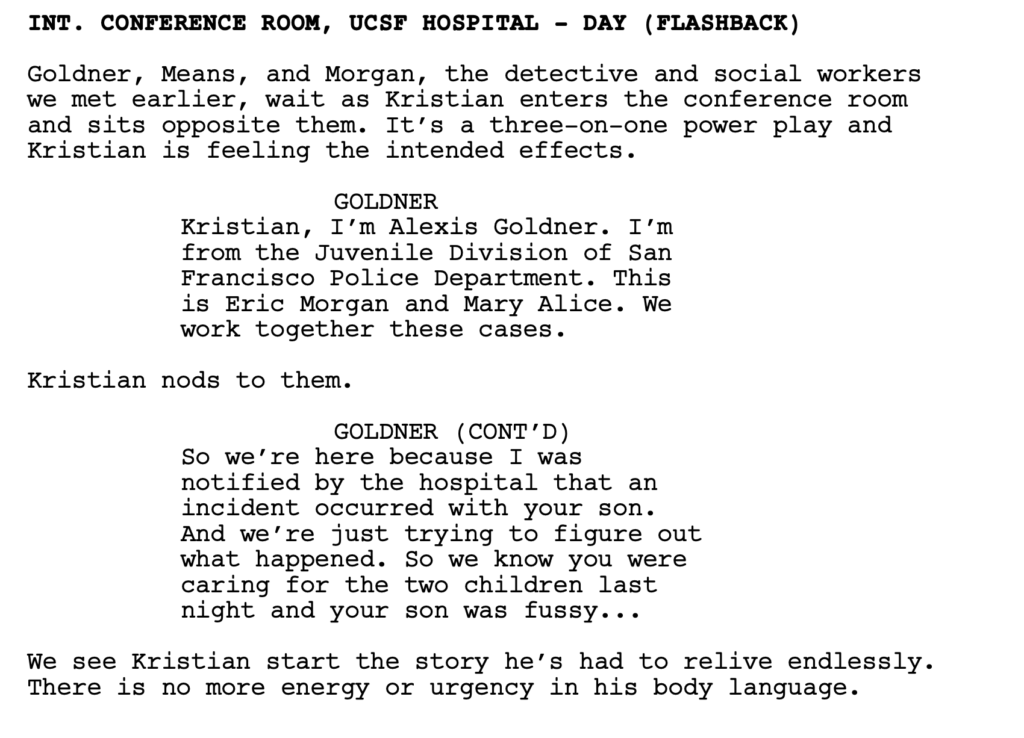
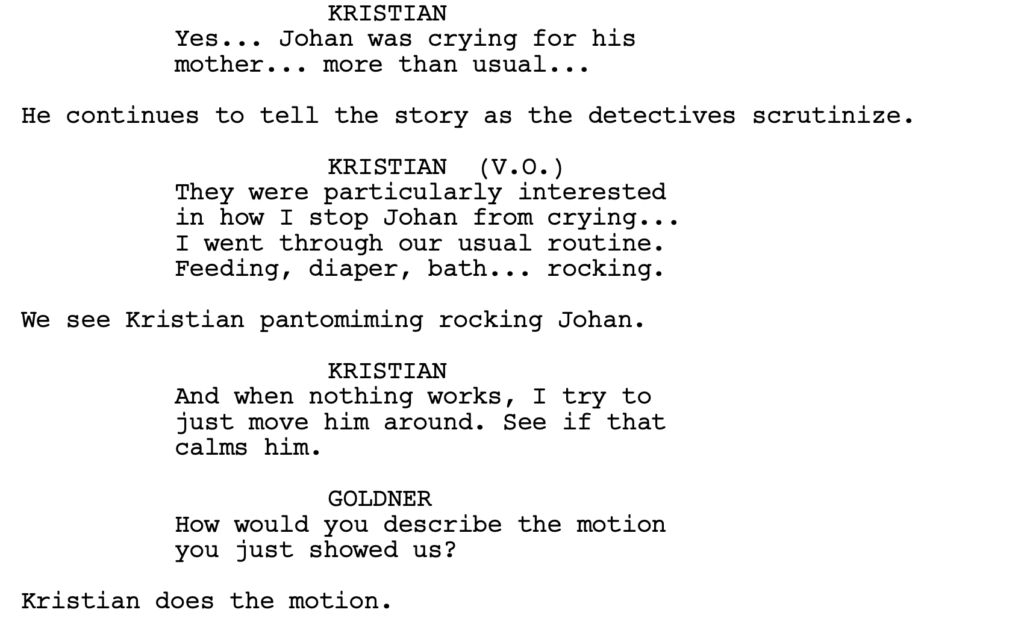
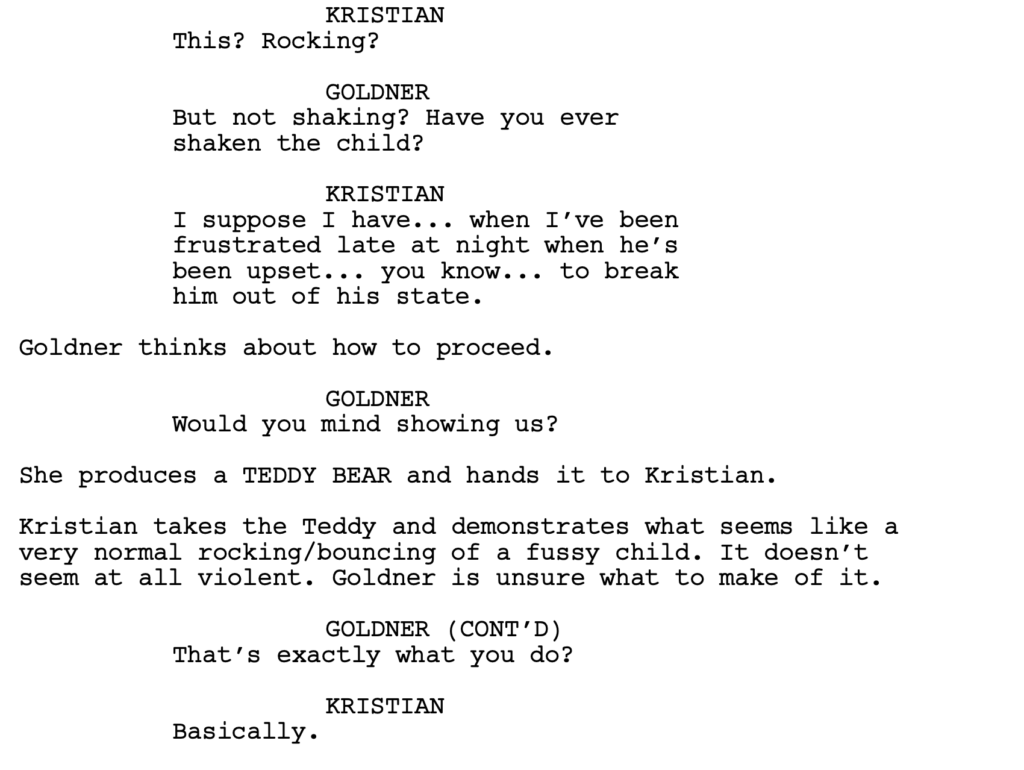
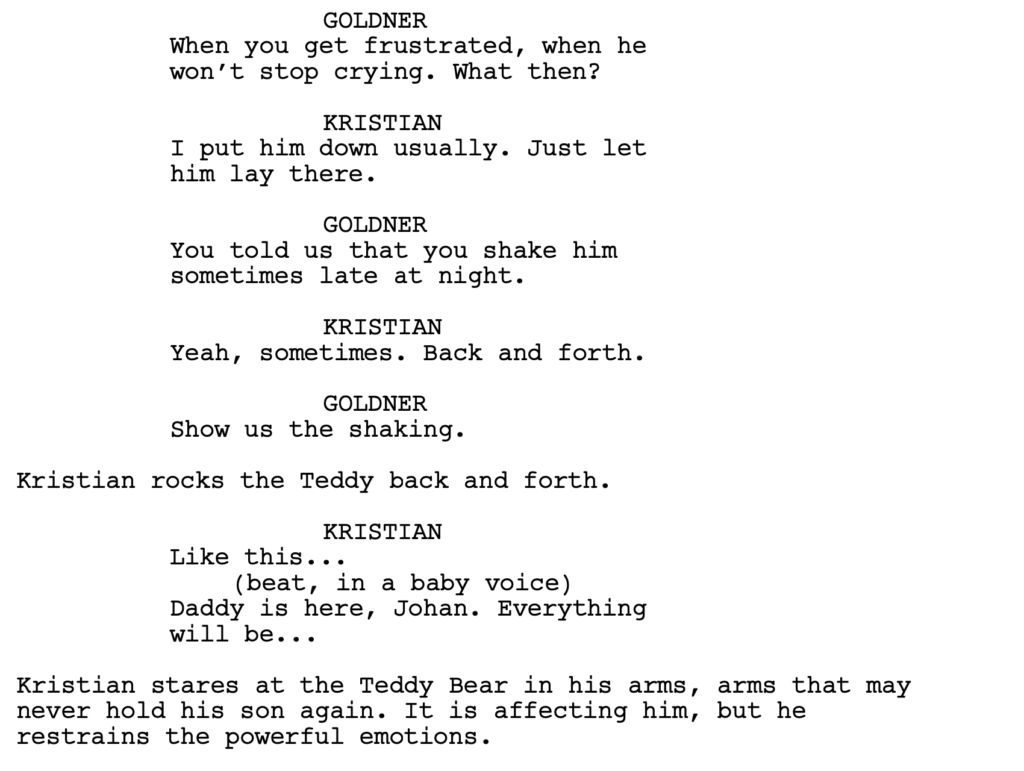
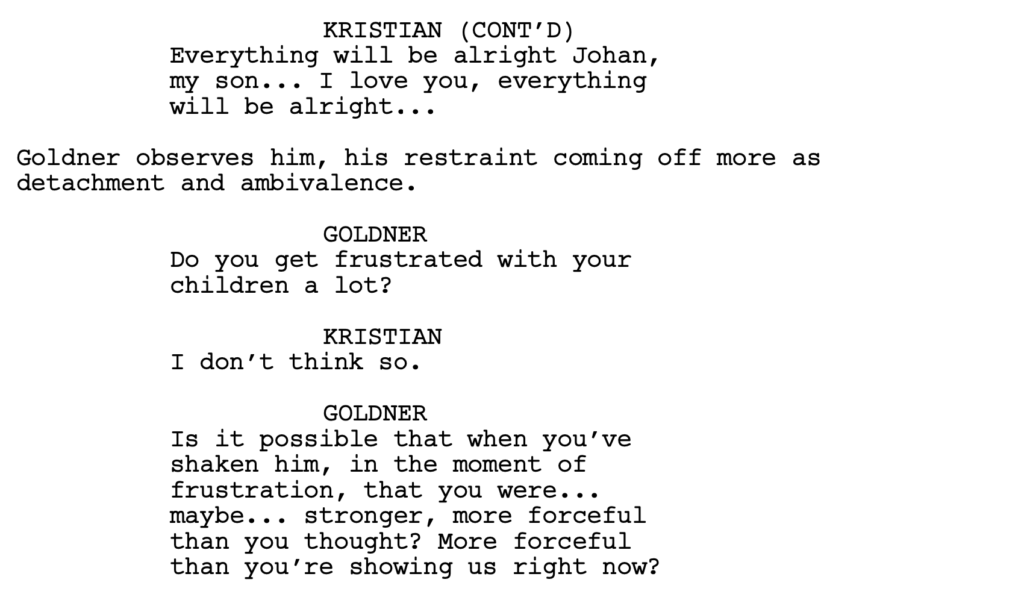
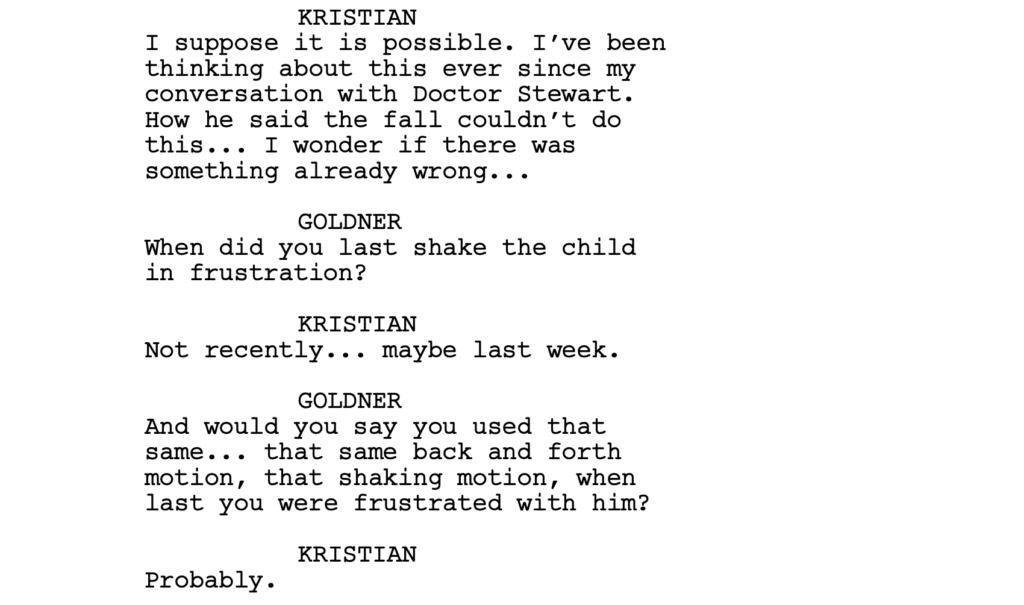
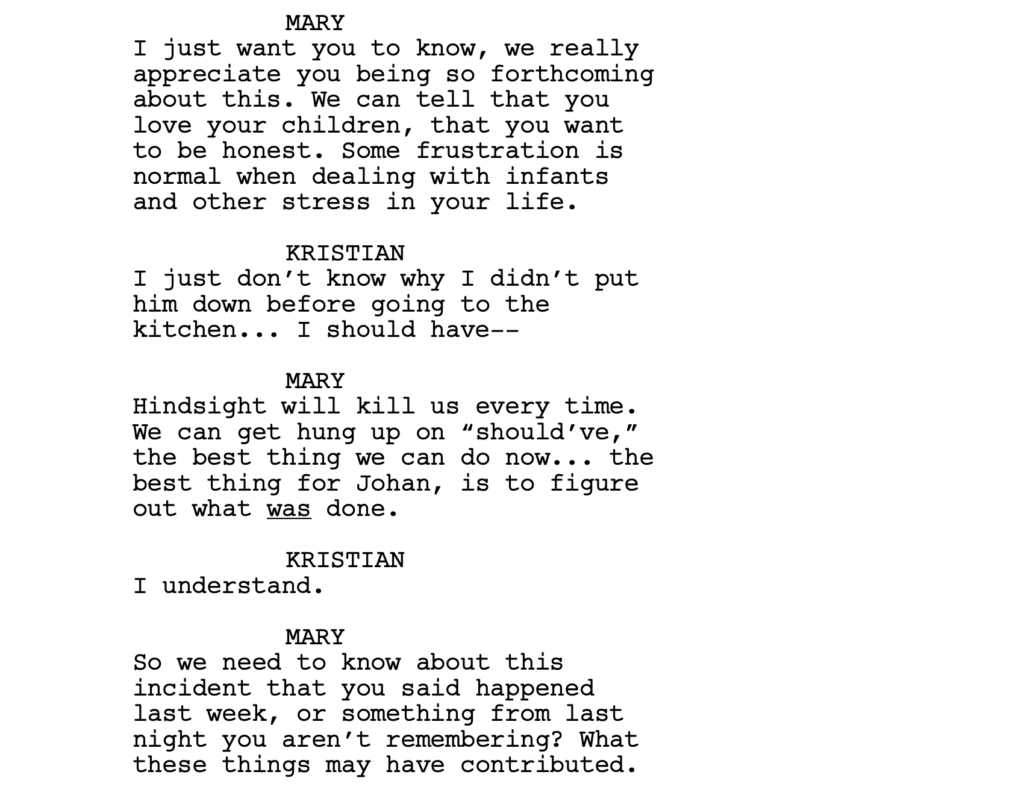
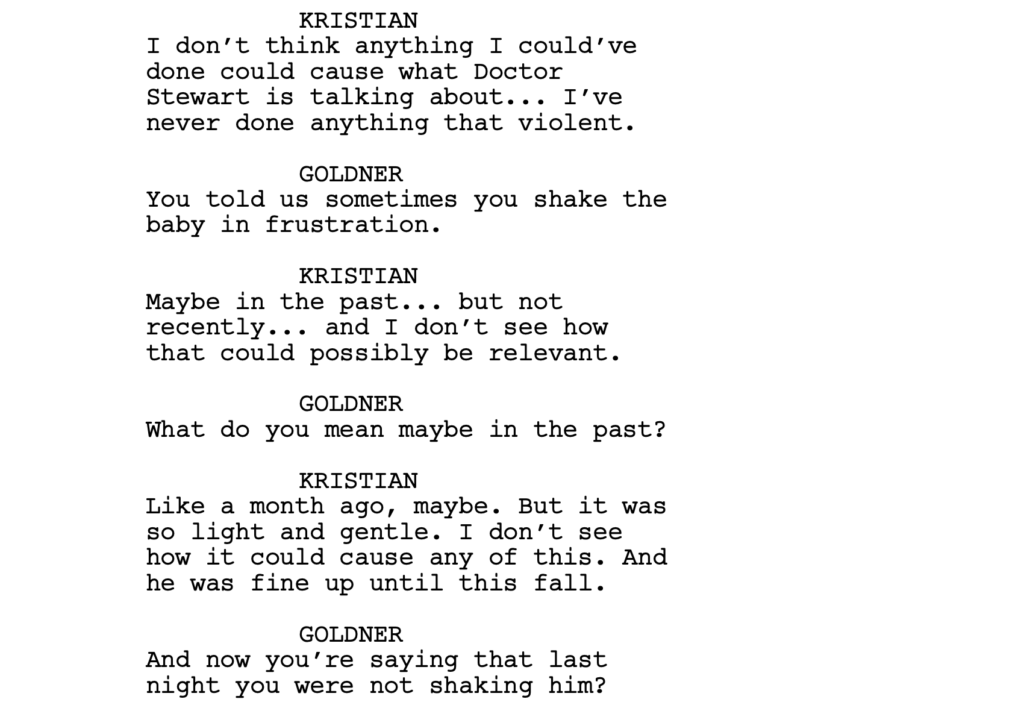
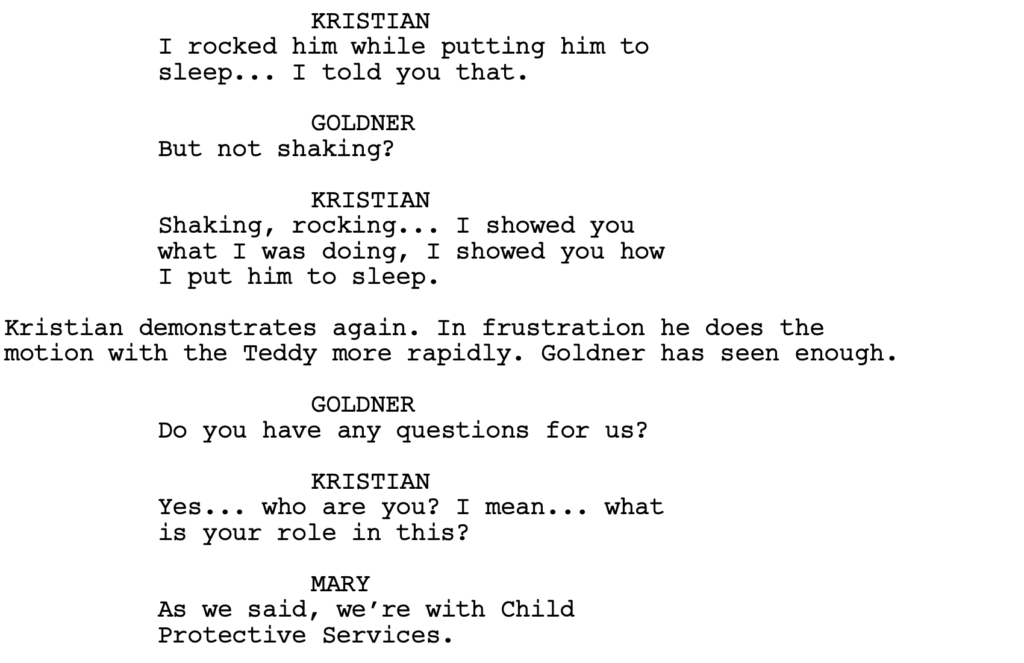
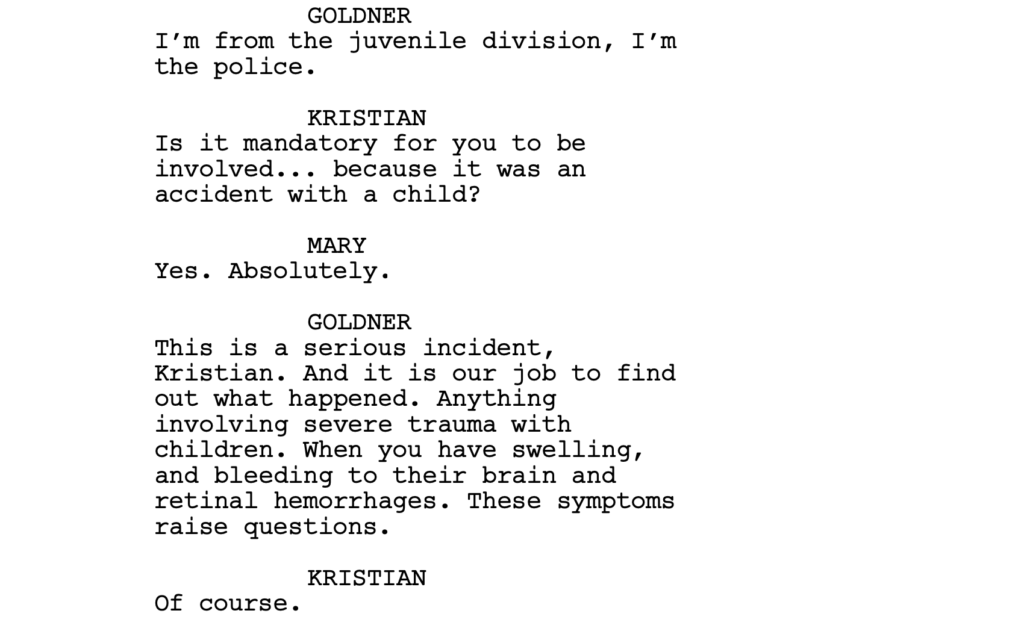
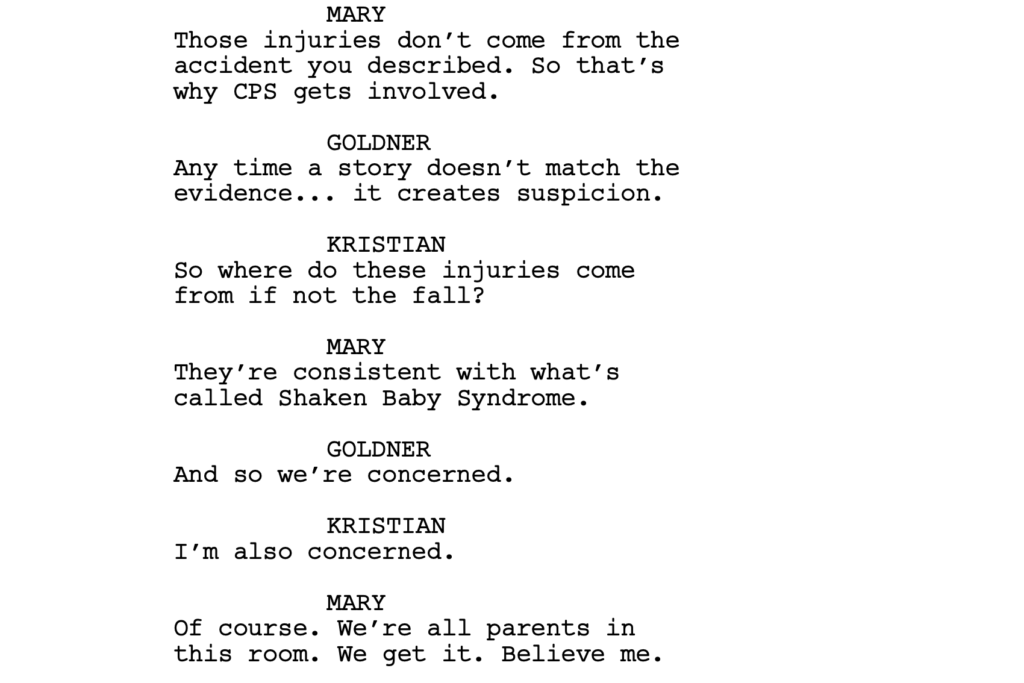
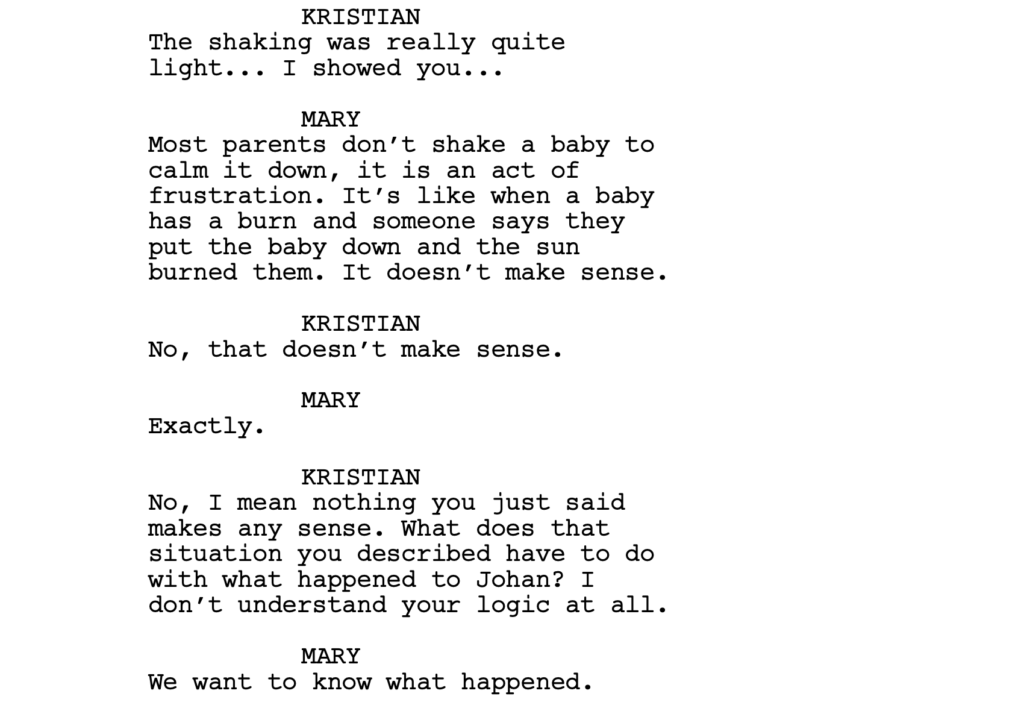
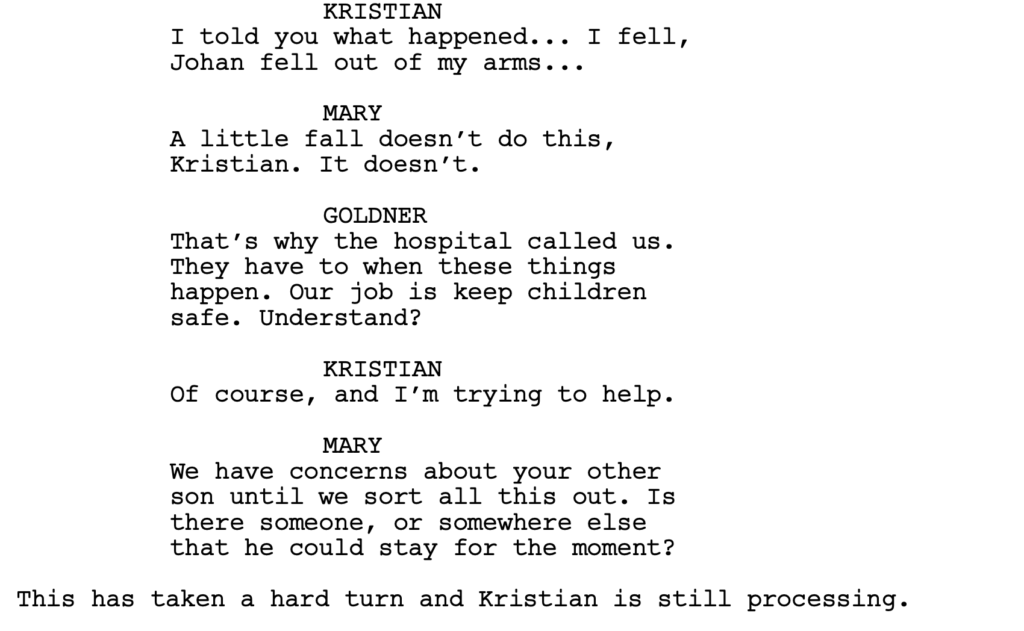
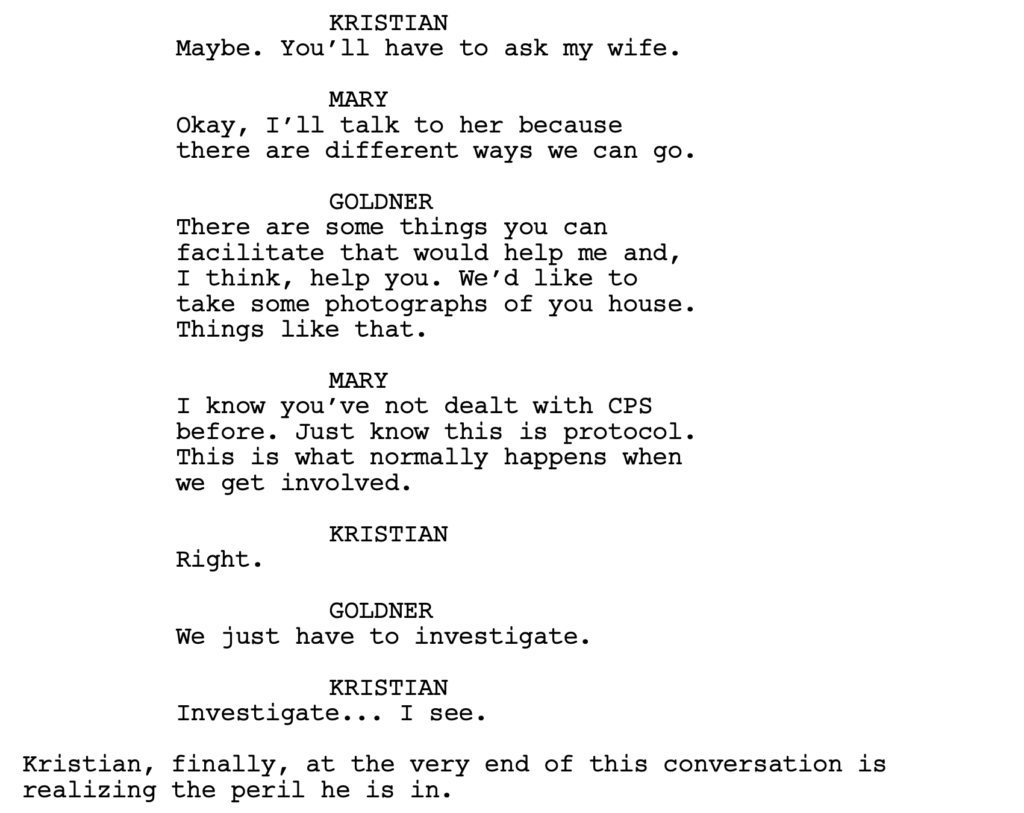
You want to note a couple of key things here. One, the child services characters have the goal in the scene. It’s to find out what led to the kid’s injury. However, here’s where our nifty dialogue lesson comes into play. The child services people are framing the conversation as if that’s the goal. But what they’re really trying to do is get Kristian to admit he killed his kid.
Dialogue always plays better when there’s something going on on the surface, as well as something that’s going on underneath the surface, which is clearly happening here.
Also, note the extremely high stakes of the scene. If Kristian screws up and says the wrong thing, he doesn’t get a pass. That thing very well could be the smoking gun the prosecution uses to convict him of murder in court. Dialogue is electric when the stakes are high.
Another thing is that the child services people are being disingenuous. They’re trying to trick him – pretending they’re on his side when they’re the exact opposite. What this does is it makes the reader protective of Kristian. We feel like he’s being misled, so we become his ally in the scene. We’re rooting for him to survive.
Finally, note the conflict. Almost every good dialogue scene has some level of conflict in it. And what creates more conflict than one side trying to ruin a guy’s life and the other side hanging on for dear life?
By the way, the reason this doesn’t have to be Tarantino-type dialogue is because the content of the scene is so strong. There are real consequences to this moment. And when that’s the case, you don’t need to prove your verbal jousting skills. Those will actually make the scene worse.
Once you’re able to consistently write a scene like this, you’re going to be okay dialogue-wise. Cause these scenes can really carry a script. Just note that a lot of the work here was done before the scene, not in the scene. Once the scene is set up, the dialogue writes itself.
I’m still not thrilled that the overall feeling I get from this script is one of depression. I like to either feel good at the end of a script or, at the very least, I want it to make me think. With that said, the script surprised me by how much it pulled me in. So I think it’s worth checking out.
[ ] What the hell did I just read?
[ ] wasn’t for me
[xx] worth the read
[ ] impressive
[ ] genius
What I learned: It helps in these scripts when the case is about something bigger than just winning the case. While False Truth isn’t making a point about racism or anything gigantic like that, it is about the fact that these “shaking baby” cases are bogus and that evil overly-emotional people have been using their influence to convict a lot of innocent people through pseudo-science. So we do get the sense that the court victory has a bigger effect on the world.
Genre: Romantic Comedy
Premise: With the future of Manhattan’s Chinatown at stake, a stubborn store clerk battles against an innovative CEO’s expansion plan, while both are unaware they’ve been falling in love with each other on a new, anonymous dating app.
About: This script finished on last year’s Black List. William Yu has written a couple of short films, one of which he directed.
Writer: William Yu
Details: 117 pages (!!)
 I don’t know who this is but she should star in this movie
I don’t know who this is but she should star in this movie
*****WE INTERRUPT THIS REGULARLY SCHEDULED PROGRAM*****
With White Lotus doing so well at the Emmys, I wanted to remind you of the ENTIRE WEEK I once took to praise this amaaaaaaaazing series. Here ya go!!!
Day 1
Day 2
Day 3
Day 4
Day 5
*****NOW BACK TO TODAY’S REVIEW****
As we continue this theme of ‘what makes good dialogue’ that I will loosely continue over the next few weeks in the lead up to the Scriptshadow Dialogue Book, I thought it’d fun to review a romantic comedy, a genre that is designed to showcase dialogue. I figured, good or bad, we could learn a thing or two about dialogue today. So let’s jump to it!
We’re in Chinatown, New York City. Sophia Chao is so focused on her “WeWork” like startup company that she hasn’t had a lot of success dating. Hence, she says “screw you guys, I’m outta here” (no, she didn’t really say this) and focuses on convincing three elderly store owners to sell to her so she can start building her “OpenSpace” headquarters.
The grandson of one of these owners is Brandon Wong. Brandon is Chinese-American and very adamant that big corporations are bad! Very bad! He spends a lot of time protesting and protecting the traditions of his hometown. When he learns that Sophia is trying to build a company on his street, he takes his protesting to the next level.
Now since both characters are sick of the dating scene, they start using a new anonymous dating app. No pictures. Just an algorithm that matches you up. In case you were wondering, Brandon and Sophia match and start chatting on the app. They don’t want to go on dates. They just want to chat on the app. And start falling for each other.
Then Brandon gets some bad news. His grandma actually wants to sell the store and move to Florida! If she does this, Big Bad Sophia will win and Brandon can’t have that. So Brandon makes his grandma promise to give him the summer to drum up business and start making some real money for the store. She reluctantly agrees and Brandon is off to the races, all while occasionally bumping into Sophia and having no idea she’s his online girlfriend.
Let me start off by saying the hoops we have to jump through to buy into this story are so high, they require the latest Air Jordans to reach. The writer needed a way to have these two date each other without knowing who the other was, so he set up an anonymous dating app with no pictures and then, even after they start dating, they don’t want to see each other, which, of course, is necessary, since the second they see each other, the plot doesn’t work anymore. It pummels the suspension of disbelief into submission.
I will say that I liked the choice to make the guy the local business owner and the girl the big mean CEO. That was different from what I’m used to seeing. But outside of that, I struggled to find things to celebrate here.
Let’s get to the dialogue cause that’s our focus these days. Here’s any early exchange where Brandon and Francis meet at a protest and debate the challenges of dating in the modern era. Brandon doesn’t do a lot of dating, which Francis takes exception with.
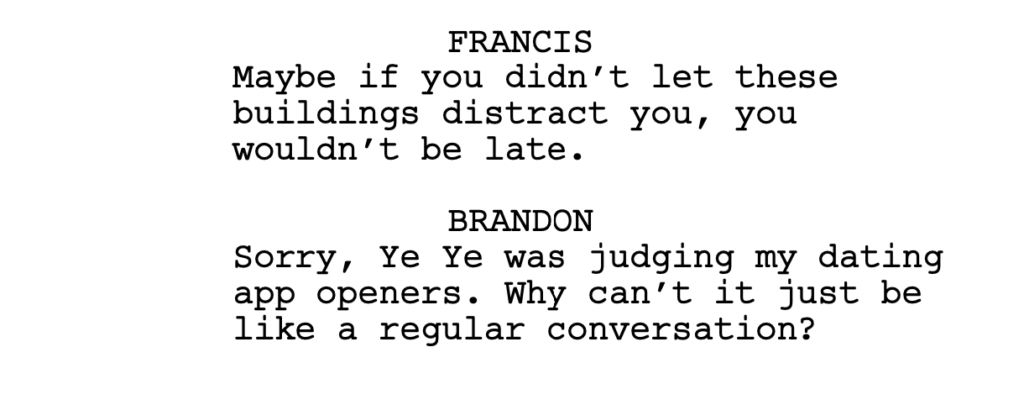
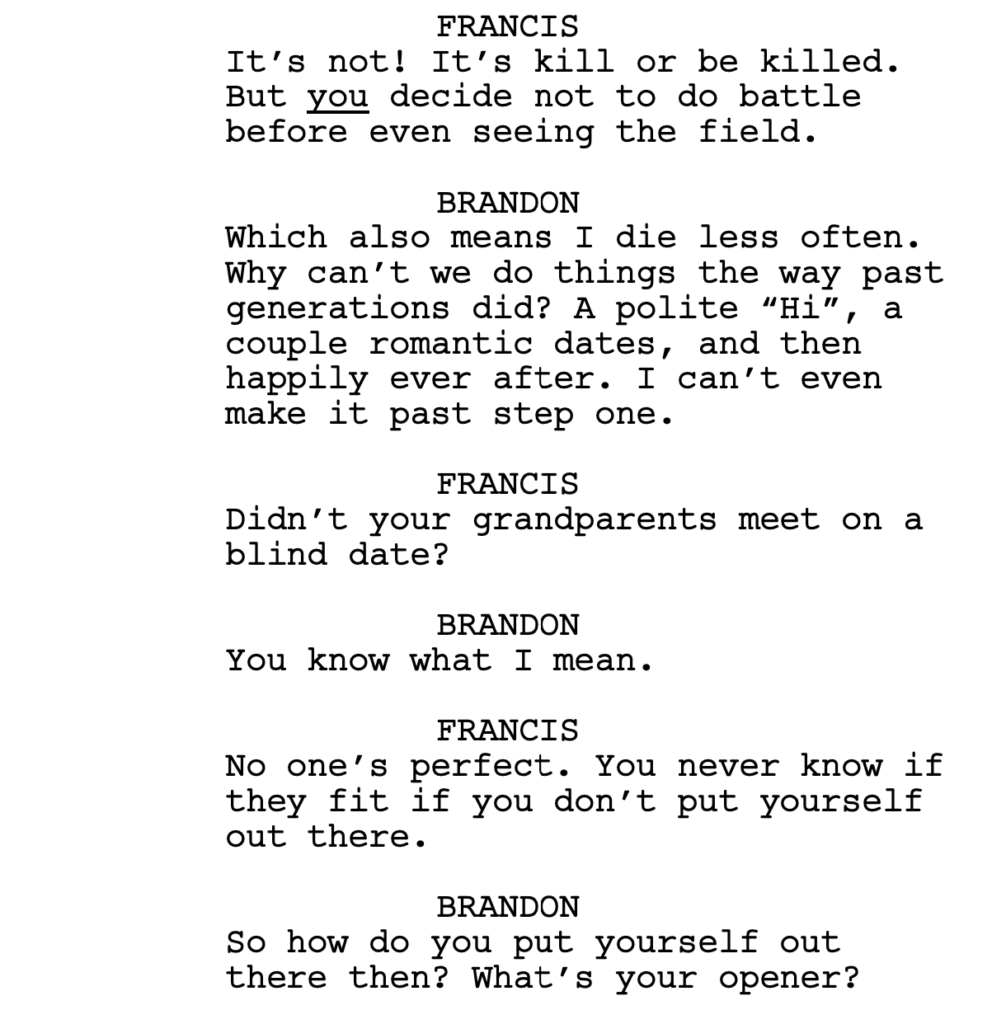
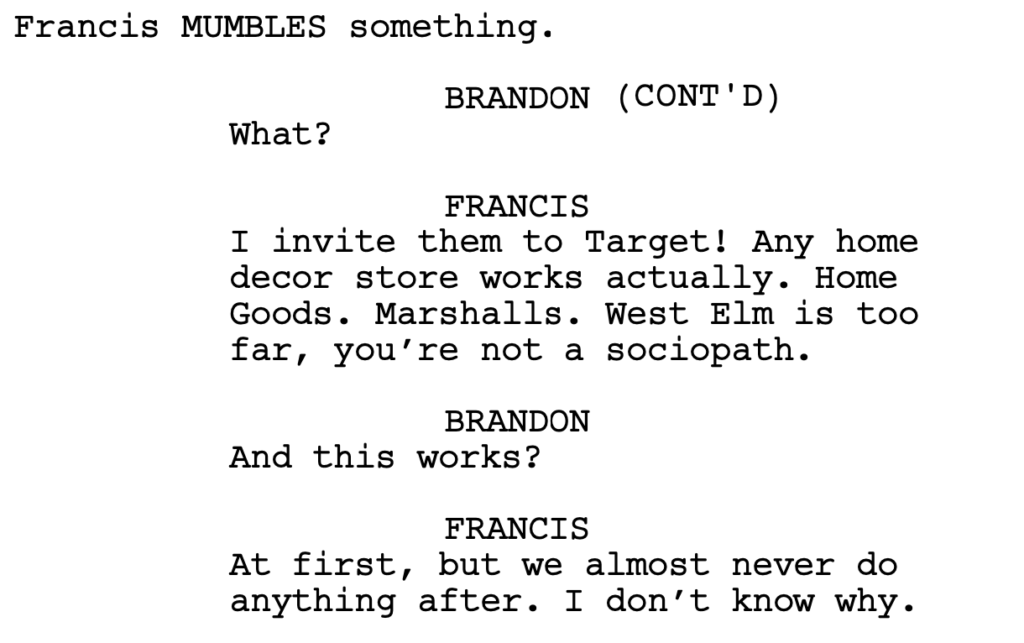
Okay so we start out with an analogy. And in my dialogue studies, I’ve realized that analogies can be a big asset in sprucing up dialogue. Everyone likes a good analogy. But here’s the rub. It’s gotta be a good one. And this one is okay, I guess. Comparing dating to war is something I’ve heard before so it’s not exactly a fresh take on the topic, which you would prefer your analogy to be. But it’s an okay start.
From there, we cover a little backstory. We introduce some character information, as we’re learning about Brandon’s dating past. But then we run into, “No one’s perfect.” This is such a boring common phrase that it generic-izes the conversation. When characters say generic things, we start seeing the dialogue as generic.
Even though I didn’t love the war stuff, the writer probably should’ve continued on with that analogy. Keep using the war stuff to explain their thoughts and ideas about dating. You introduced it. You might as well keep using it.
We then come to Francis’s strategy on dating. Francis is clearly the comedic relief in the film. For that reason, you need him to be funny. I know that sounds obvious but what I mean is: chuckle-worthy isn’t enough. He has to be legitimately funny. And here, he uses this Target line, which I like in that it’s SPECIFIC. He didn’t say something generic like, “I just give’m a taste of that Francis charm.”
But the joke has to have some logical setup and payoff to it that we understand and therefore laugh at. I’m not sure this has that. I suppose it’s kind of funny that he takes them to these random places. But then we get the line, “West Elm is too far, you’re not a sociopath.” Assuming we’re on board with the running home decor joke, what does one of these places being too far away have to do with being a sociopath?
It’s that “bridge too far” thing that we all struggle with as writers. The joke makes sense in our head because we can see the 5 other dots we’ve connected to get to the punchline. The reader can’t see those other dots, though. They see the first (home decor date) and the last (sociopath for stores that are too far away) and can’t make the connection.
Now you have to understand, the script I read right before this – for my dialogue book – was the Fleabag pilot. And Waller-Bridge’s jokes are so light-years ahead of everything that it was a bit like listening to Chopin and then Justin Bieber. I mean look at the difference here…
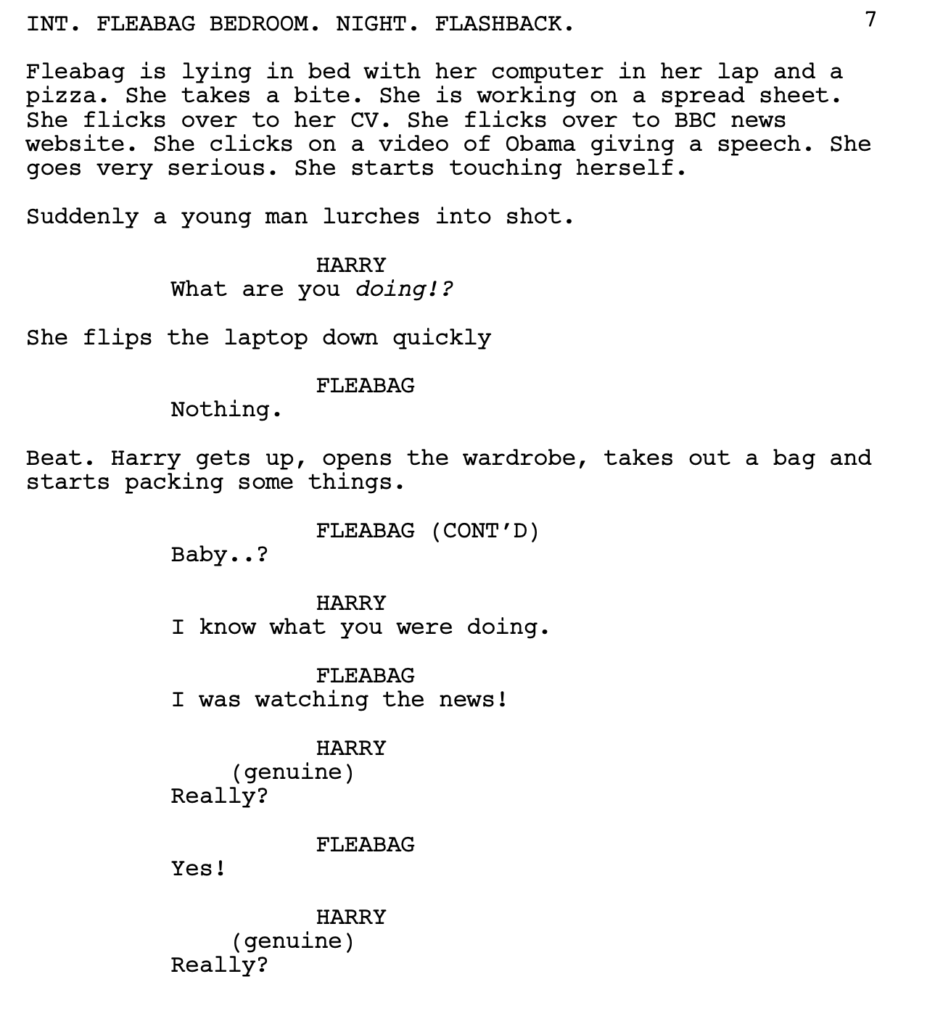
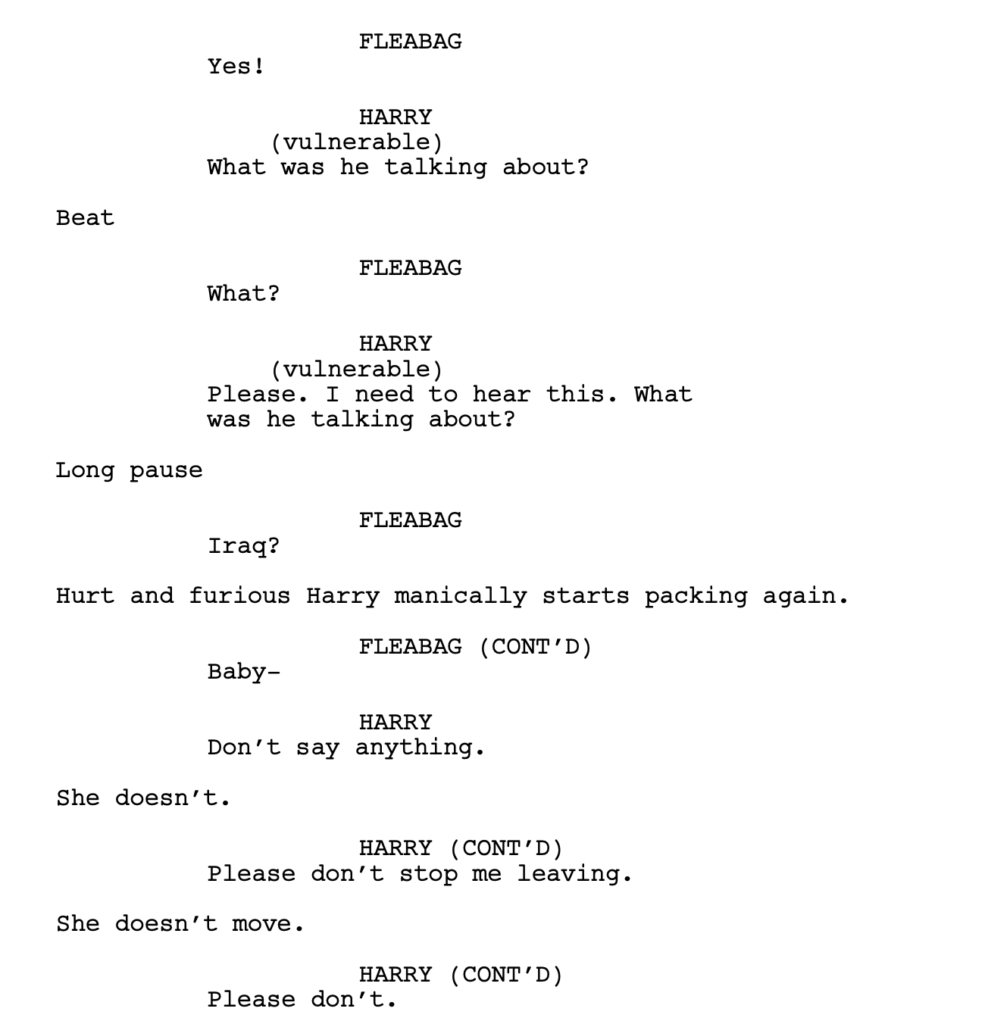
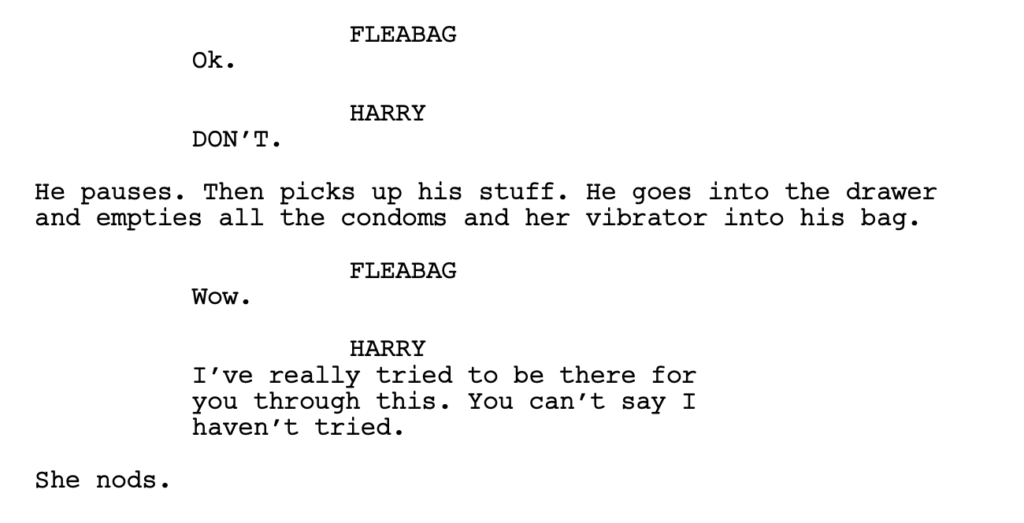
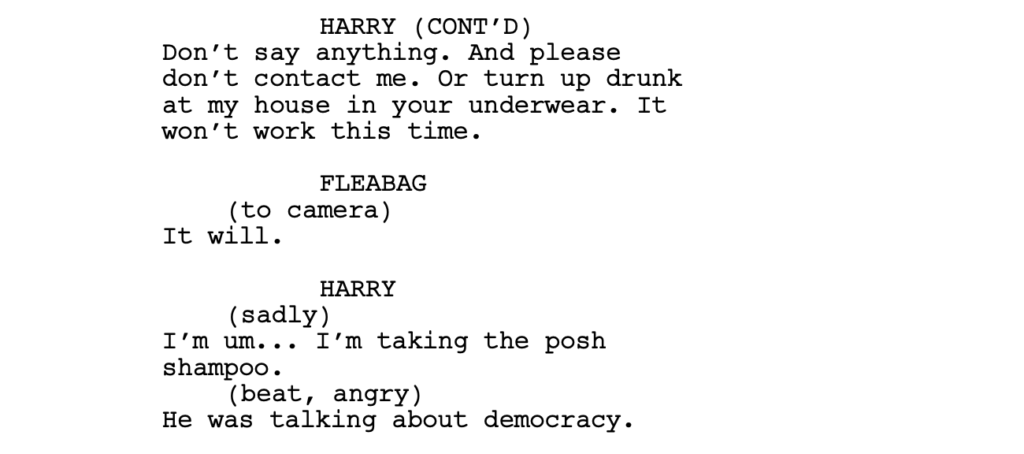
The scenario itself is so much more clever and unique. Who starts masturbating to a political figure’s speech? But it wasn’t just that. The boyfriend’s reaction clearly informs us that this has been an ongoing problem, which makes the interaction even funnier. And then we watch as she desperately squirms to try and save herself, which is always fun to watch. All of this is made even funnier by the fact that the previous scene has her meeting a guy, the guy asking if she has a boyfriend, and when she tells him, no, they just broke up, the guy assumes that the guy is the one who screwed it up. We then immediately cut to the above scene.
Anyway, getting back to It Was You.
The last line is Brandon asking Francis if his dating strategy works and Francis saying, “No it doesn’t, and I don’t know why.” An obvious punchline like this isn’t very funny because it’s not at all surprising. Francis informing us that a lousy dating tactic has lousy results is… expected, right? So where’s the joke? It would’ve been funnier if he’d told us that a lousy dating strategy actually worked great! So a line like, “Believe it or not, my success rate is about 80%.” Cause we’re not expecting that.
This is what’s hard about writing dialogue. We all think different stuff is good. We all think different stuff is funny. But one of my simplest criteria for objectively analyzing dialogue is, “Could this scene have been conceived of and written in ten minutes?” If so, the writer isn’t doing enough. This scene definitely feels like that.
You have to get into the reader’s head and ask what they’re expecting from this dialogue and try to outsmart them or keep coming back to the scene and trying to one-up the jokes in it. “Is this the funniest line I can use here? Is there something better?” Every rewrite, keep trying to top yourself with the jokes.
So why was that Fleabag scene so unique? How can you pull that off as a writer? I suspect that one of Waller-Bridge’s friends shamefully admitted to her, on a night out drinking, that she masturbated to the Prime Minister on TV once. And Waller-Bridge took that idea and said, what if the Fleabag character not only did that, but it was an ongoing problem in her relationship?
That’s how you build the framework for original funny situations. The problem most writers make is that they’re drawing from movies that they’ve seen instead of real life. So they’re just rewriting scenes that have already been written, which is definitely what this scene from It Was You felt like.
Unfortunately, I’ve run out of time to judge the rest of the script but I think it’s safe to say that you can guess what happens. There are a few fun scenes when the two ignorantly run into each other in real life. But the script can never overcome the amount of buy-in it’s asking for. I just couldn’t get past the anonymous dating app thing. Name me one person in the world, who isn’t blind, that uses dating apps without pictures.
[ ] What the hell did I just read?
[x] wasn’t for me
[ ] worth the read
[ ] impressive
[ ] genius
What I learned: Every time you write a scene of dialogue, I want you to imagine that dialogue posted here, on this site, in the cold naked light of day. Would it hold up? Are you mentally making excuses for it? If so, time to rewrite that dialogue, baby.

